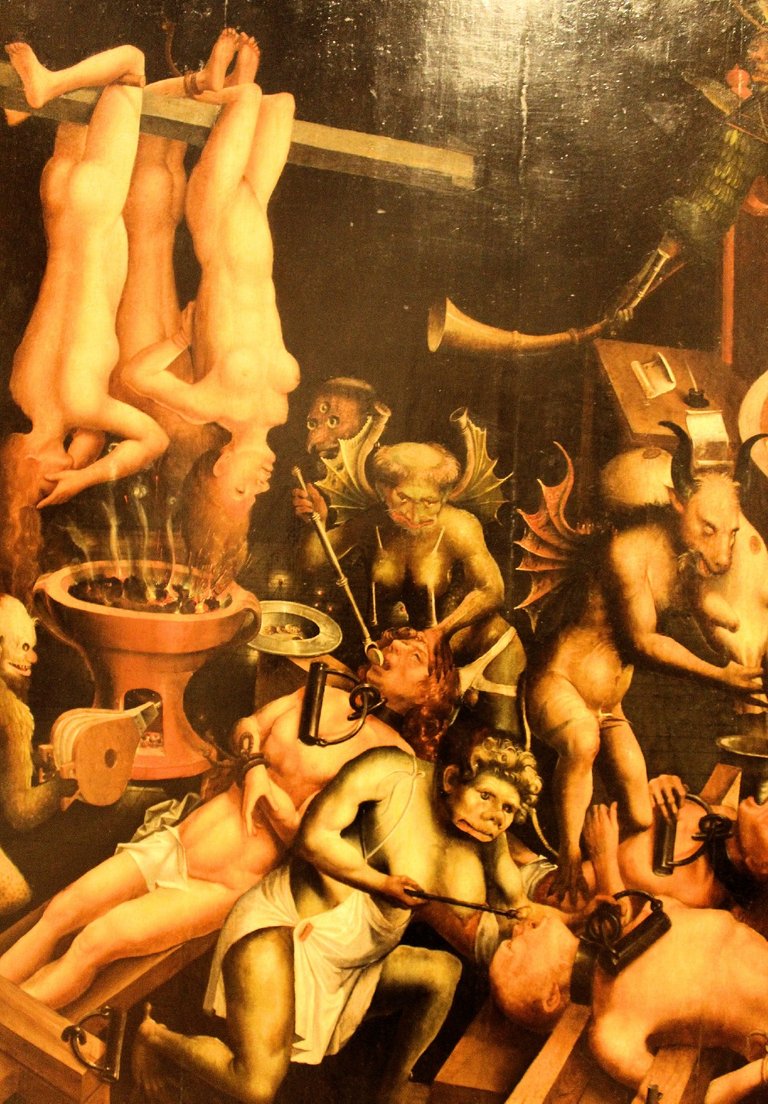For those of us who were raised in Christian households but later apostatized, there’s a strong temptation to cast off everything remotely Christian. Understandably it’s upsetting to discover you were lied to, often by people who did not, themselves, realize they were lying (having not yet arrived at the same conclusion you did).
That would be an overreaction, though. There’s much in the teachings of Jesus to fault, but equally much to admire. Surely even if he was only the founder of an unusually successful cult, a member of the same small, exclusive club as the likes of Muhammad, Joseph Smith and L. Ron Hubbard, there’s still many useful lessons we can learn from scripture.
Each of us suffers all manner of slings and arrows between childhood and adulthood. Even in developed countries, the road of life has many bumps and potholes. Almost nobody makes it out of childhood without suffering various traumas, and different people process/integrate those traumas in different ways.

Till Niermann via Wikipedia Commons
The path of least resistance is to conclude that the world is wicked and dangerous, letting trauma distort your perspective. Seeing all of the bad, but none of the good. It’s the easiest thing in the world to then say “Whatever this wicked world inflicts upon me, I may also inflict upon the world”, as if you’re a karmic mirror of some kind.
It’s easy in that surrendering to the world, letting it sculpt you into its own likeness, absolves you of the moral responsibility of deciding who you’re going to be. As if you don’t have any say in the matter. As if you don’t have agency in your own personal development.
But of course you do. Simply being aware of this process, having consciously made the decision to let traumatic experiences shape you demonstrates you’re also self-aware enough to reject the world’s influence. Each of us can, at any time, retake the reigns of our personal development. Deciding to go against what the world has taught us, shaping ourselves according to our own ideals instead.
“Karmic mirrors” are a big part of why the world’s in such a sorry state, surely? If you just mindlessly retaliate to every provocation, all you’re doing is passing on harm, propagating it like a wave throughout a substrate made of humans. It could stop with you if you decided not to react, or even to react with kindness.
There’s all kinds of reasons why people come at you wrong, not all of which are irredeemable. Maybe they got dumped a few minutes ago. Maybe they were just at their mother’s funeral. All we have to go on is a snapshot of them on what might be their worst day.
They’re feeling mangled by the world, and to them, you’re part of it. You’re just another asshole in the crowd. They anticipate rudeness from you, and so are rude pre-emptively. If you surprise them by responding with kindness, there’s a chance you may wake them up from this fatalist mindset, by going against their expectations.
There’s a good chance you can reverse their downward spiral, even if only temporarily. You can at least de-escalate a negative interaction which might’ve otherwise turned into a needless fight, all by repressing your retaliatory urges and instead doing something totally contrary to human instinct.
This is a principle that was communicated to the gaming public in a wildly popular RPG called Undertale, wherein it’s possible to avoid almost every fight in the game through de-escalation and diplomacy. Getting to know the monsters reveals their reason for lashing out, and as they get to know you in turn, soon they no longer want to fight either.

Toby Fox via Wikipedia Commons
It’s the closest thing to a popular, best selling Christian game we’re ever likely to see, as overtly Christian games made by actual Christians generally turn out like Catechumen, Zoo Race or Captain Bible in the Dome of Darkness. They’re not a people famous for subtlety or competence.
Lucky for them, Toby Fox came along and communicated Jesus of Nazareth’s central teaching in the form of an addictive, iconic videogame that has been purchased, played and loved by millions…albeit one with many gay and gender bending characters in it.
Enter: The Prisoner’s Dilemma
I feel safe assuming everybody’s heard of the ++Prisoner’s Dilemma++ by now. ++The Evolution of Trust++ is a game based on the principles explored in the Prisoner’s Dilemma, meant to illustrate various socioeconomic/interpersonal strategies employed by human beings as well as both their short and long term outcomes.
The game’s premise is that you and someone else are separated by a machine neither of you can see past. On each side of the machine is a coin slot, and return tray. If you put a coin into the slot on your side, three coins come out the return tray on the other player’s side.
If you both cheat, neither of you get anything. If you cheat, you get a higher payout in the short term, but probably nothing in the long term as the other player will cease cooperating with you. Likewise if he cheats, you’re unlikely to cooperate with him after that.

Nicky Case, the Evolution of Trust
The various strategies can be seen above. The Christian strategy is “Always Cooperate”, in the stylish pink hat. Always Cheats are the psychopaths of the world. Detective is the cold blooded, calculating sociopath specifically searching for Always Cooperates to take relentless advantage of. He’s able to get away with it for longer because he exercises a level of restraint and discretion that Always Cheat isn’t capable of.
Grudger is most people. They’ll give anybody a chance, but only one. If you smack the olive branch out of their hand, it’s never-ending hostility after that with no possibility of reconciliation. This is the mindset the Bible speaks to when extolling the virtue of forgiveness.
Copycat is the karmic mirror I talked about earlier. He’s not as determined in his anger as the Grudger, willing to resume good relations as soon as the other party does. But he’s also less willing than the Grudger to assume the best going into any interaction. He’s the true neutral, imagining himself wise and pragmatic. Indeed, the copycat strategy is ++generally very effective++ at both protecting this player from being exploited, and in coercing cooperation from other players by his example.

Monozigote via Wikipedia Commons
So, it would seem Jesus of Nazareth is refuted, right? We should all give exactly as we get. One wrong turn deserves another, and anything which the world inflicts upon us, we may also inflict upon the world. How could it be any other way? Isn’t retaliation as fundamental a right as self defense?
Well, not so fast. There’s a common scenario in which the Copycat strategy consistently leads to bad outcomes with no possibility of self-correction. In short, accidents happen. Sometimes the other player drops the coin, making you think he chose to cheat. Sometimes you run into a stranger on their worst day.
The Copycat would of course immediately retaliate with equal severity. If the other person is an Always Cheat or a Detective, Copycatting will protect you, coercing partial cooperation from the Detective and heaping well deserved punishment on the Always Cheats.
But if the other person is also a Copycat, or a Grudger, then you miss out on an opportunity for cooperation (and eventually trust) by setting off a never-ending cycle of revenge. “An eye for an eye makes the whole world blind”, as Ghandi supposedly put it.
The Copycat is superior to the Grudger in this scenario, only in that if the other person happens to be an Always Cooperate who simply made a mistake, there’s a chance to reconcile. If either one fucks up with the Grudger though, game over. That’s a bridge which, once burnt, can never be rebuilt.
I do not mean to suggest it’s practical for everybody in the world to be an Always Cooperate. I don’t think that’s possible, as for one thing it’s deeply contrary to human nature. ++All primates have a very strong instinctual sense of fairness grounded in reciprocal altruism++, aka the Copycat strategy.

This means almost nobody starts out as an Always Cheat or Detective though, contrary to the pessimistic view in scripture that humans are inherently depraved, with deeply wicked hearts only possible to reform by religious moral teaching. This is the worldview of a wounded man-child who never outgrew his trauma. It’s more accurate to say we start out more or less neutral, with an instinctive inclination towards reciprocity.
That’s good news, surely? Except it’s such a strong instinct that if your goal is to turn everybody into an Always Cooperate, you’ve really got your work cut out for you. From a Doylist perspective that doesn’t assume the foundational supernatural claims of Christianity are true, it can still be charitably viewed as a clever attempt to trick the Always Cheats, Detectives, Grudgers and Copycats of the world into being Always Cooperates, using the bribe of an unfalsifiable post-mortem paradise and the threat of an unfalsifiable post-mortem torture pit as as sort of carrot and stick, with Jesus and Yahweh as the good cop / bad cop.

It’s a great idea on paper. I personally resent attempts to manipulate my behavior via trickery but I also recognize the world’s full of people whose brains will contain more false ideas than accurate ones whether you trick them or not, and whose behavior is sorely in need of reforming.
So, how has it worked out in practice? Let us intentionally ignore the Detectives pretending to be Always Cooperates in our analysis. The Kenneth Copelands and other televangelists, the Donald Trumps and so on, who would be bad faith examples as they’re not sincerely convinced of Christianity. Looking only at average Americans, considering only those sincerely, fervently convinced of the resurrection and all that implies, has their belief made them into Always Cooperates?
Jesus would have us judge them according to their fruits. A good tree can only bear good fruit, and a bad tree can only bear bad fruit. Has sincere belief in the claims of the Christian religion succeeded in turning bad trees into good ones?

Alberto Giuliani via Wikipedia Commons
So far, the fruits of American Christians (and to a lesser extent European Christians) have included evolution denial and obstruction of accurate education on that topic, denial of climate change, obstruction of climate action, opposition to gay marriage and general LGBT rights, Covid denial and vaccine obstructionism, and opposition to single payer universal Healthcare.
Those last two are related. In the US, Christians make up nearly all Covid hospitalizations because of the relationship between Christianity, Qanon, conservative politics, conspiracy theories and ++religiously motivated science denial++.
These are the people who could’ve really used single payer healthcare, if only they supported it. Even the ones who survive are saddled with ruinously expensive hospital bills, to say nothing of what becomes of their surviving family members should they perish. Their reliance on Gofundme to pay for their self-inflicted Covid related medical expenses, when the vaccine was free, is the punchline to a tragic joke indeed.
Are Christians less racist than average? The election of Donald Trump suggests otherwise, as does the commonality of racist jokes on the timelines of Christian Covid deniers who later end up in the ICU, or a bodybag. Are they less violent than nonbelievers? Should we quantify that by gun ownership? Political violence at protests? The January 6th capitol riot? Suggestions that we nuke Mecca in retaliation for 9/11, or the now nigh-constant veiled threats of a civil war if the Biden administration isn’t removed from power?

jakob.liew via Wikipedia Commons
Are Christians a rare sight in prisons? ++Data suggests otherwise++, with atheists less common in prison than anybody, save for (interestingly) Pentecostals. Affiliation was self-reported and collected at the time of intake, though prisoners can report a change in their religion through chaplains. The main objection to this is that prisoners commonly convert in the hopes of appearing pious, thereby gaining leniency in subsequent trials or the favor of parole boards.
Setting aside how fucked up it is that such a pressure exists to extort even performative conversion from a literal captive audience, this still doesn’t furnish any evidence that atheists are the wicked ones. That’s what we ought to expect them to be if the human heart is inherently wicked, only able to overcome its dark nature with the help of Christianity. The data we have isn’t great, but all of it so far points in the other direction.
In my experience atheists are far more commonly Copycats than Always Cooperates, as we should expect given that they don’t have any ideological reason to go against their reciprocal altruism instinct. But where we might expect Christians to be mainly Always Cooperates, at least in the US and Europe, we instead find their ranks overrun with Always Cheats and Grudgers, with Detectives in religious leadership roles.
Perhaps we shouldn’t be surprised? Christians often say Christ was sent for the benefit of sinners, not well behaved people who have no need of his teachings in the first place. But then, why is their behavior unchanged? Should we conclude their belief isn’t genuine? Surely nobody who believes Hell is real would behave as these people commonly do.
I would speculate that the human brain’s talent for rationalization explains this. We’re champs at excusing our own misbehavior. Millions of German Christians rationalized their membership in the Nazi party. Colonial America was full of white Christians rationalizing slavery, although in that case they had scriptural support. US Christians by and large turned their nose up at Obama, who has been married but once, while pledging their undying devotion to Trump, who has been married three times and had innumerable mistresses.
It can’t be because they’re secretly not Christians. Human psychology is more complicated than that. Somehow these people have promised themselves salvation, and believe it’s guaranteed simply because of what they believe. Which, in their mind, constitutes a blank check for misbehavior. If salvation is by faith alone, good works are not only irrelevant, they’re a foolish waste of time and resources on useless eaters who need to pull themselves up by their bootstraps.
Human Nature Can’t Be Over-Written
Humans aren’t robots, that we can be so easily reprogrammed. You can change our beliefs by indoctrination and brainwashing. You can exploit our cognitive biases to protect those beliefs against doubt, originating either internally or inspired from outside by skeptics. But you cannot fully subdue our primal urges.
Human nature, our original instinctual programming, can’t be over-written. Any replacement operating system sitting atop that BIOS which tries to significantly change or repress it is doomed to failure, as our power to rationalize will invent workarounds, so that our primal urges can be satisfied anyway. Jews do the same thing, rationalizing labor on the Sabbath by a number of amusingly litigious workarounds, to say nothing of the many other loopholes in the 613 Mitzvot.
So, what does a more practical solution look like? Our nature is to be Copycats. Always Cooperate is too severe a deviation to reliably sustain at scale, human nature eventually overcomes it by way of rationalization. But a world in which everybody’s a Copycat quickly deteriorates into never-ending cycles of revenge. Is there a middle path? What would a functional, sustainable compromise between Copycat and Always Cooperate look like? What ratio of one to the other would constitute the prefect blend?
Supposing you were to (of course) react to kindness with kindness, but when you’re on the receiving end of cruelty from a stranger, you react with kindness just once? As a test, in order to account for those instances when someone’s having a bad day and thus not their usual self.
If you offer them this second chance and they rebuff you, then you’ve lost from a game theory perspective, but only that one time. It cost you a little, but it didn’t bankrupt you, so to speak. Now you can safely return to Copycatting them with no fear that you mistook a Copycat, Grudger or Always Cooperate in a bad mood for an Always Cheats or Detective.
I think most people can manage to consistently put this into practice, as it doesn’t ask much. Just that, when a stranger is rude, we allow the possibility that they’re out of sorts and experimentally react with kindness once. This doesn’t make you a saint, but if you’re like me, you’re not trying to be. You’re just trying to be human, doing the best you can in a chaotic, flawed world.
Low Effort Beats No Effort
In the same way that just thirty minutes of light exercise per day (like walking) delivers most of the benefits in later life health outcomes you might hope to attain with longer, more intense exercise, there’s a point of diminishing returns for altruism as well. If you ask average humans for too much of it, they won’t bother. But most of the benefits can be had with even a little bit, if applied consistently.
I would also compare it to the error-correction mechanisms in your own DNA. It’s not foolproof or mutation (and thus evolution) couldn’t occur. But it is fault tolerant enough that only a few mistakes make it through, here and there. Without that, we’d all just be walking tumors.
Christ’s message was beyond state of the art in de-escalation and harm reduction for when he lived. “Try to be perfect like God, understanding you will fall short” ultimately produces Copycat+ behavior, as described four paragraphs down. That’s more or less the result that inconsistent efforts to be an Always Cooperate give you, in practice.
However because it instructs us to shoot for an unobtainable goal, even though it warns us we’ll fall short, this approach also results in disappointment, guilt, neuroticism, legalism and rationalizing misbehavior as either righteous after all, or forgiven anyway.
A slightly more optimized message might read “Go ahead and be a Copycat. Evolution made you that way for good, sensible reasons. But also be fault tolerant, at the very least letting the first offense slide, or possibly investigating their reason for lashing out if you want the A+”.
This is because fault tolerance is an all-purpose lubricant for social encounters which prevents friction from causing needless damage. It doesn’t ask much of you, but delivers big time on de-escalation, turning a vast majority of potential fights into potential friendships.
The Copycat+ strategy, as I’ve elected to call it, offers a very high bang for your buck (where bucks are measured in emotional labor/self-restraint). It doesn’t require you to be Superman, just adds “bad day check” as a precautionary step before going nuclear. “Be a little bit better than you absolutely have to”, rather than “try to be perfect even though you’ll fail.” I think I can probably swing that. How about you?






Congratulations @alexbeyman! You have completed the following achievement on the Hive blockchain and have been rewarded with new badge(s) :
Your next target is to reach 150000 upvotes.
You can view your badges on your board and compare yourself to others in the Ranking
If you no longer want to receive notifications, reply to this comment with the word
STOPCheck out the last post from @hivebuzz: